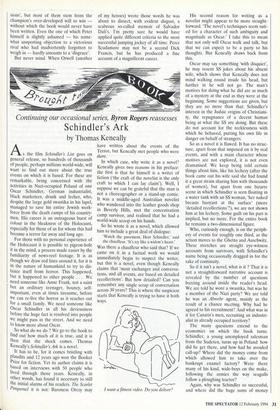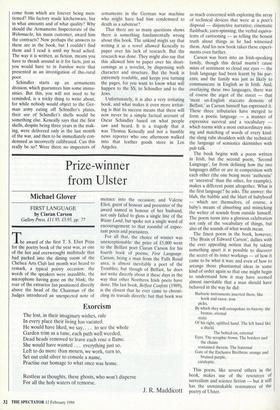N.,.... , M -- - - =.=. - - - - - .. - - 1. - - - - — MIK "gir ArAlrn- ___ __ ____
----• . 7-7.--716-- —_—_------E-- _ z9-------_--- 1'cli"oA t t - ---....--"7-2-2•Is 0.--- Continuing our occasional series, Byron Rogers reassesses
Schindler's Ark
by Thomas Kene ally
As the film Schindler's List goes on general release, so hundreds of thousands of people, perhaps millions world-wide, will want to find out more about the true events on which it is based. For these are remarkable, being concerned with the activities in Nazi-occupied Poland of one Oscar Schindler, German industrialist, black marketeer, drunk and lecher, who, despite the large gold swastika in his lapel, managed to save his entire Jewish work- force from the death camps of his country- men. His career is an outrageous burst of colour in the bleakness of the Holocaust, especially for those of us for whom this had become a terror far away and long ago.
For those with no personal experience of the Holocaust it is possible to pigeon-hole It in the mind, a process made easier by the familiarity of news-reel footage. It is as though we draw red lines around it, for it is in the nature of humankind to try to dis- tance itself from horror. This happened, but it happened to other people . . . We need someone like Anne Frank, not a saint but an ordinary teenager, bouncy, self- important, even at times tiresome, before we can re-live the horror as it reaches out for a small family. We need someone like Oscar Schindler in all his deviousness before the huge fact is resolved into people we might pass in the street. And we need to know more about Oscar.
So what do we do ? We go to the book to find out how much of it is true, and it is then that the shock comes. Thomas Keneally's Schindler's Ark is a novel.
It has to be, for it comes bristling with plaudits and 12 years ago won the Booker Prize for fiction. Yet its author claims it is based on interviews with 50 people who lived through those years. Keneally, in other words, has found it necessary to still the initial alarms of his readers. The Scarlet Pimpernel it is not: Baroness Orczy may
have written about the events of the Terror, but Keneally met people who were there.
In which case, why write it as a novel? Keneally gives two reasons in his preface: the first is that he himself is a writer of fiction ('the craft of the novelist is the only craft to which I can lay claim'). Well, I suppose we can be grateful that the man is not a choreographer or a stand-up comic.
It was a middle-aged Australian novelist who wandered into the leather goods shop in Beverly Hills, met the concentration camp survivor, and realised that he had a world-wide scoop on his hands.
So he wrote it as a novel, which allowed him to include a great deal of dialogue: 'Watch the pavement, Herr Schindler,' said the chauffeur. 'It's icy like a widow's heart.'
Was there a chauffeur who said that? If we came on it in a factual work we would immediately begin to suspect the writer, but this is a novel, even though Keneally claims that 'most exchanges and conversa- tions, and all events, are based on detailed recollections'. But how detailed? Can you remember any single scrap of conversation across 30 years? This is where the suspicion starts that Keneally is trying to have it both ways.
1 want a fitness video. Do you deliver? His second reason for writing as a novelist might appear to be more straight- forward. 'The novel's techniques seem suit- ed for a character of such ambiguity and magnitude as Oscar.' I take this to mean that not only will Oscar walk and talk, but that we can expect to be a party to his thoughts. But Keneally draws back from this.
Oscar may say something 'with disquiet', he may resent SS jokes about his absent wife, which shows that Keneally does not mind walking round inside his head, but further in he will not go. The man's motives for doing what he did are as much of a mystery at the end as they were at the beginning. Some suggestions are given, but they are no more than that: Schindler's interest in the Judaic origins of Christiani- ty, the repugnance of a decent human being at what the SS are doing. But these do not account for the recklessness with which he behaved, putting his own life in danger on behalf of strangers.
So as a novel it is flawed. It has no struc- ture, apart from that imposed on it by real events, and with a main character whose motives are not explored, it is not even dramatised. We keep being told certain things about him, like his lechery (after the book came out his wife said she had found it a great strain sharing him with thousands of women), but apart from one bizarre scene in which Schindler is seen floating in a water tank with an SS woman, 'her naked breasts buoyant at the surface' (more 'detailed recollections'?), we are not shown him at his lechery. Some guilt on his part is implied, but no more. For the entire book he remains a two-dimensional figure.
Who, curiously enough, is on the periph- ery of events for roughly one third, as the action moves to the Ghetto and Auschwitz. These stretches are straight eye-witness accounts from survivors, with Schindler's name being occasionally dragged in for the sake of continuity.
So if it isn't a novel, what is it ? That it is not a straightforward narrative account is revealed by the number of questions buzzing around inside the reader's head. We are told he wore a swastika, but was he a member of the Nazi party? We are told he was an Abwehr agent, mainly as the result of a chance meeting. Why had he agreed to his recruitment? And what was in it for Canaris's men, recruiting an industri- alist in already occupied territory?
The many questions extend to the economics on which the book turns. Schindler, a young unemployed salesman from the Sudeten, turns up in Poland: how did he get there, and how had he avoided call-up? Where did the money come from which allowed him to take over the bankrupt enamel factory? Were there many of his kind, wide-boys on the make, following the armies the way seagulls follow a ploughing tractor?
Again, why was Schindler so successful, and where did the huge sums of money
come from which are forever being men- tioned? His factory made kitchenware, but in what amounts and of what quality? Why should the Armaments Inspectorate of the Wehrrnacht, his main customer, award him the contracts? Now perhaps the answers to these are in the book, but I couldn't find them and I read it until my head ached. The way it is written, as fiction, means you have to thrash around in it for facts, just as you would have to in Ivanhoe were that presented as an investigation of the,. Ural poor.
Schindler starts up an armaments division, which guarantees him some immu- nities. But this, you will not need to be reminded, is a tricky thing to write about, for while nobody would object to the Ger- man army eating off Schindler's plates, their use of Schindler's shells would be something else. Keneally says that the first shells, despite being three years in the mak- ing, were delivered only in the last month of the war, and then to be immediately con- demned as incorrectly callibrated. Can this really be so? Were there no inspectors of armaments in the German war machine who might have had him condemned to death as a saboteur?
That there are so many questions shows there is something fundamentally wrong about this book. The unkind might say that writing it as a novel allowed Keneally to paper over his lack of research. But the research was done. They might also say that this allowed him to paper over his short- comings as a novelist, by dispensing with character and structure. But the book is extremely readable, and keeps you turning the pages, for you want to know what will happen to the SS, to Schindler and to the Jews.
Unfortunately, it is also a very irritating book, and what makes it even more irritat- ing is that its success means that there will now never be a simple factual account of Oscar Schindler based on what people saw and heard. It is a tragedy that it was Thomas Keneally and not a humble news reporter who one afternoon walked into that leather goods store in Los Angeles.



















































 Previous page
Previous page